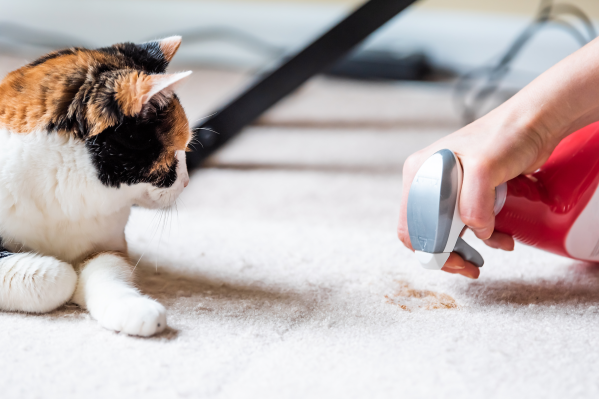Cats are known for doing what they want, when they want. So when your adult cat starts peeing outside the litter box, you might take it personally. There are several reasons why a cat may start doing this, and some close observation or a chat with a vet can help you figure out the cause.
Making sure your cat is okay is the first priority, so the sooner you get to the bottom of it, the better (and let's be honest, no one loves the smell of cat pee).
Here's an overview of reasons why your cat is peeing outside the litter box (the reasons are a bit different than if your cat is still a kitten), what you can do about it, and when it may be time for a vet visit.
Why isn’t my cat using the litter box?
There are multiple reasons why your cat may have started to forgo the litter box, some of which are more serious than others.
“For adult cats, we want to emphasize the importance of ruling out medical causes even more than kittens, especially when it is an older adult cat that does not have a history of inappropriate urination and has not had any recent stressors introduced into their environment,” explains Dr. Yui Shapard, who adds that common stressors include a new guest or roommate, a new pet, and moving into a new home.
Medical issues
There are several medical problems that may cause your cat to pee outside of the litter box. Conditions like an infection or inflammation of the urinary tract (cystitis), bladder stones, and kidney stones could cause your cat to pee where they shouldn’t. Other ailments like kidney disease, diabetes, hyperthyroidism, arthritis, and cancer could also be culprits.
“We want to be more cognizant of ruling out medical cause before assuming behavior in older cats,” explains Dr. Shapard. “But some additional signs that would indicate calling your vet pronto would be vomiting, lethargy, straining or vocalizing in the litter box, decreased appetite or inappetence, as well as discoloration of the urine, such as blood.”
To see if your cat may be suffering from any of these ailments, Pawp offers on-demand telehealth appointments with veterinarians on call 24/7.
Behavioral issues
There are also behavioral reasons why your cat is peeing outside the litter box.
Many behavioral issues may come from the litter box itself. Some cats prefer a clean box, for example, and may decide to go elsewhere if the litter box isn’t up to their cleanliness requirements. Cats may also eschew a litter box if it is hard to reach—something that may change as your feline friend gets older—or if they don’t like the type of litter used.
As Dr. Shapard mentions above, anxiety is also a common reason why cats pee elsewhere. If there’s been a major disturbance to your cat’s daily life like a move or a new pet being introduced to the household, your cat may pee in places you wish they wouldn’t.
What to do if your cat is peeing outside the litter box
For behavioral issues, it’s worth getting a new litter box and keeping it as clean as possible by removing poop and pee daily to see if that makes it more enticing for your cat.
You can also try using multiple litter boxes so there is always one easily available to your cat, or try new litter to see if your feline friend prefers another kind.
If your cat is peeing outside the litter box because they’re anxious, you can help make their living environment calmer by using an anti-stress plug-in pheromone, which may help calm them down.
For medical issues, your vet can help you identify the specific ailment your cat has and prescribe treatment to help get them back on track.
When should I call the vet?
It’s worth it to chat with a vet right away about your cat’s change in behavior, as older cats are more likely to have medical issues than younger ones. You and your vet can discuss your cat’s specific peeing issues and work together to come up with a course of action to get your cat feeling better and going to the bathroom in the appropriate place.

Reviewed and fact-checked by
Yui Shapard, BVM&S, MRCVS and Medical Director at Pawp
